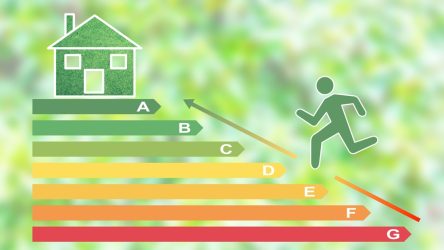Improve the BER introduction
The Building Energy Rating (BER) is a rating given to a property following an assessment of how energy-efficient it is. A property’s BER is calculated on a scale from A-G, with A being the most energy-efficient and G being the least. You can learn about the BER certificate and what it means here.
Knowing where to start when trying to improve the energy efficiency of your property can be difficult for most people, especially those with little knowledge on construction and energy use. To help the average property owner better understand where to begin, we have written a simple guide introducing you to the primary elements that are considered for the BER as well as giving easy to understand explanations on how to improve them.
Follow the links to learn about a topic and how it affects your BER, how you can improve it and see what grants you can access. Improving the BER on your property is not only good for the environment, but it will also save money on energy bills, make your home more comfortable and increase it’s value.
It is important to understand that following the guidance given on these pages will not result in specific BER ratings for a property. This information is here to help simplify understanding how each element in a residential property contributes to it’s BER and explain the options that are available to improve it. If you are planning energy efficiency upgrades and you want to achieve a specific BER target, it is important to employ the services of a trained professional to design the right solutions.
For any works being carried out, please carry out your due diligence on the contractor and ensure they have the necessary training and qualifications to complete the job to the required standards.

What gives a property a poor BER?
There are many factors that contribute to a poor BER rating for a residential property but the most important one to deal with is poor insulation. The rate that heat is lost through a wall, floor, roof, window or door is determined by its U-value. You can read more about U-values here. The lower the U-value, the better the insulating properties of that element. Poorly insulated properties will have high U-values across all their elements and will lose heat quickly, leading to increased energy consumption and higher heating bills. Properly insulating a property is the most important factor when trying to improve the BER.
Old and outdated heating systems are less energy efficient and consume more fuel compared to newer, more efficient models to produce the same amount of heat. Older central heating systems also have poor controls over hot water production as well as uninsulated hot water storage. A heating system with limited controls can result in excessive energy usage, leading to a low BER rating. For example, not having zoned remote heating controls can result in heating rooms that are not in use or not being able to turn on the hot water without heating up all the radiators will use unnecessary energy during the warmer months when heating is not needed.
A property with a lot of draughts is the last major piece that can bring down a BER. Open chimneys, draughty windows doors and attic hatches, unsealed suspended timber floors and gaps in the external walls where pipes and cables enter, all contribute to heat escaping. Minimising the amount of warm air that escapes will help improve the BER but it is important to maintain some kind of ventilation to keep clean air circulating and prevent damp. Follow the link to see examples of the elements on a house that will give it a low BER.
Why improve the BER of a property?
Improving the Building Energy Rating of your property can have several benefits. Firstly, it will reduce your energy bills, as a more energy-efficient home requires less energy to keep warm and keep comfortable. This means you can save money in the long run, making it a smart investment.
Secondly, an improved BER can increase the value of your property. As more and more people become environmentally conscious, energy-efficient homes are becoming increasingly popular amongst buyers. Having a good BER can make your home more attractive to buyers, which can translate to a higher sale price.
Improving your BER will also reduce your carbon footprint. By using less energy, you are contributing to a greener future and helping to protect the environment.
One great way to start improving your BER is by taking advantage of the SEAI home energy grants. These grants are designed to encourage homeowners to improve the energy efficiency of their properties by providing financial assistance for energy upgrades. They can help cover the costs of insulation, heating upgrades, ventilation, and renewable energy systems, making it easier and more affordable for you to improve the BER on your home.
